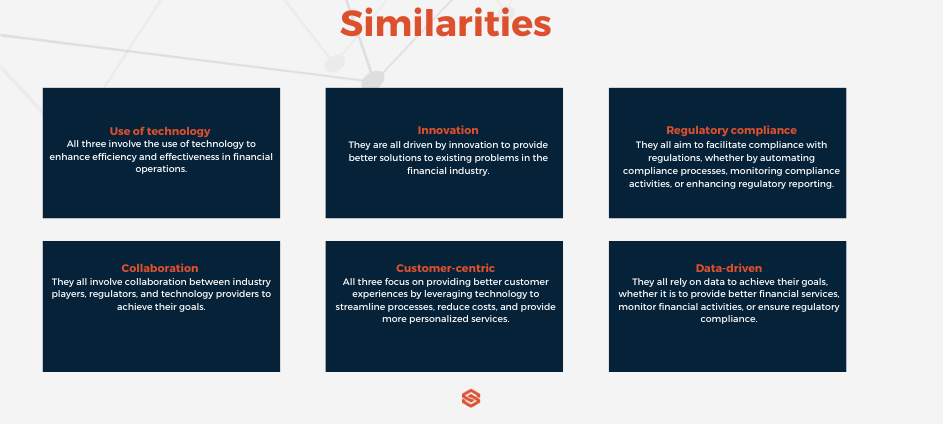In today's rapidly evolving financial landscape, it can be challenging to keep up with the latest industry jargon and buzzwords. Three terms that are often mentioned are RegTech, FinTech, and SupTech. While they may sound similar, these terms refer to distinct areas of financial technology that have different functions and purposes. In this blog post, we will explore the differences between these three types of technology and their impact on the financial industry. We will also examine the benefits and challenges of each technology and its potential for future growth. Whether you're a financial professional or simply curious about the latest developments in financial technology, this blog post will provide valuable insights and information.
RegTech, FinTech, and SupTech share several similarities, including:

What Is FinTech?
The term financial technology (Fintech) points to new technology that aims to improve and automate the delivery and usage of financial services. Fintech, at its heart, is used to assist corporations, company owners, and consumers in better managing their financial operations, procedures, and lives through the use of specialized software and algorithms that are practiced on computers and, more, smartphones.
In general, the word "financial technology" refers to any advancement in how people do business, from the introduction of digital currency to double-entry accounting. However, financial technology has grown rapidly since the internet and mobile internet/smartphone revolutions, and fintech, which originally belonged to computer technology applied to the back office of banks or trading firms, now belongs to a wide range of technological approaches into personal and commercial finance.
Fintech today refers to a wide range of financial activities that can be performed without the assistance of a person, such as money transfers, check depositing with your smartphone, bypassing a bank office to apply for a loan, saving funds for a business beginning, or managing your investments.
What Is RegTech?
RegTech, or regulatory technology, is a technology system that assists a bank, credit union, or other financial institution in managing regulatory compliance. Financial institutions are frequently overwhelmed by the sheer volume of laws, rules, and regulations they must implement, enforce, and monitor, from business continuity and vendor management to fair financing and security. RegTech aids in streamlining of the compliance process.
RegTech solutions come in a variety of shapes and sizes. Business solutions can be developed to provide a real-time 360-degree view of compliance and risk, whereas single-rule solutions are focused on a single area.
Compliance officers understand that regulation is not a black and white issue. Financial regulatory bodies allow institutions to design risk and compliance management strategies that are appropriate for their size and complexity. There is no such thing as a one-size-fits-all solution. The finest RegTech solutions combine automated, cloud-based technologies with the expertise and services of regulatory specialists with years of experience analyzing regulatory complexity. Robust RegTech solutions look at the whole picture, recognizing and analyzing the interplay of many types of risk throughout the entire company to improve efficiency. They also enable an institution to comprehend regulatory difficulties better, allowing it to direct resources to the most crucial areas rather than employing a scattershot strategy.
What Is SupTech?
Supervisory technology, often known as SupTech for regulators, refers to technological solutions that assist financial supervisory authorities in managing regulatory compliance. Supervisory agencies are in charge of managing risk in the financial sector and implementing regulations.
Just as financial companies are responsible for adhering to thousands of rules and regulations, supervisory agencies are tasked with ensuring that all of those rules and regulations are complied with by financial institutions. SupTech provides technological tools to regulatory authorities to improve efficiency through automation.
Main Differences
RegTech: RegTech is primarily focused on regulatory compliance and uses technology to automate and streamline regulatory processes. It is aimed at helping financial institutions comply with complex regulatory requirements and reducing the costs associated with compliance. RegTech solutions include automated reporting, risk management, and identity verification.
FinTech: FinTech, on the other hand, is focused on providing innovative financial services and products through the use of technology. FinTech is aimed at disrupting traditional financial services and making them more accessible, affordable, and convenient for consumers. FinTech solutions include mobile banking, peer-to-peer lending, robo-advisors, and digital currencies.
SupTech: SupTech is a newer term that refers to the use of technology by regulatory bodies to enhance supervisory functions. It includes tools such as data analytics, artificial intelligence, and machine learning to help regulators monitor financial institutions and detect potential risks. SupTech can help regulators make better decisions, improve the quality of supervision, and enhance the efficiency of regulatory processes.
RegTech Is The Regulatory Spinoff of Fintech
RegTech and FinTech are two closely related fields that are often mentioned together in the financial industry. While they share some similarities, there are also key differences between the two.
RegTech primarily focuses on helping financial institutions comply with regulatory standards, such as KYC and SAR requirements under the BSA. This involves leveraging various technologies, such as machine learning and AI, to automate data governance and reporting processes, replacing manual methods. RegTech also helps institutions comply with reporting requirements under various laws.
On the other hand, FinTech primarily focuses on using technology to improve the customer experience and help institutions connect with their customers. This includes technologies such as mobile banking, online payments, and robo-advising. While FinTech can help institutions adhere to some regulatory standards, it does not specifically focus on compliance as RegTech does.
Suptech is another related field that is often mentioned alongside RegTech and FinTech. Suptech focuses on helping regulators supervise financial institutions by leveraging technology, including machine learning and big data analytics. This allows regulators to more effectively monitor and analyze financial data and detect potential risks.
How RegTech Can Assist Your Organization in Achieving Compliance:
RegTech is a growing industry that is transforming the way financial institutions approach regulatory compliance. RegTech applications are designed to assist organizations in meeting regulatory requirements and reducing risks associated with non-compliance. The primary objective of RegTech is to make compliance more efficient and cost-effective by automating various regulatory tasks and processes.
One of the main benefits of RegTech is that it helps financial institutions to reduce client onboarding time while identifying any potential risks associated with money laundering and terrorist financing. With the digitization of the KYC process, organizations can perform due diligence in a more consistent manner, and the process becomes less laborious and time-consuming. This not only enhances the overall customer experience but also ensures compliance with relevant laws and regulations.
Another significant advantage of RegTech is that it helps financial institutions to lower the risk of fines and legal expenses. With fewer compliance infractions, firms can reduce reputational harm associated with data or cybersecurity breaches caused by insufficient compliance monitoring. RegTech tools provide real-time monitoring of regulatory developments, enabling organizations to adapt more quickly to new regulations. This allows changes to internal rules to be deployed enterprise-wide in a fraction of the time it takes to do it manually.
RegTech strategies can also help to improve data analytics, providing financial institutions with a more detailed picture of their clients' financial history, both internally and externally. This data can be used to identify potential risks, as well as opportunities for growth and diversification. By utilizing cutting-edge technology and analytics tools, financial institutions can better understand their clients' financial behaviors and create more personalized products and services.
RegTech solutions also offer significant benefits in terms of regulatory reporting timelines. These tools can improve the efficiency and speed with which new clients are onboarded and help financial institutions to report suspicious activities more quickly to the relevant authorities. This enhances the ability to detect financial threats and crimes, such as money laundering and terrorist financing, once detected. RegTech can assist in the monitoring of suspicious activities and fraud, helping financial institutions detect and respond to issues in a timely and efficient manner.
Being a Regtech, Sanction Scanner helps financial institutions comply with rules and regulatory frameworks defined by local and global regulators. If you want to comply with those legislations and learn about our solutions, you can request a demo and contact us for further details.





